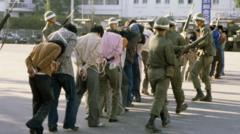Koh Jae-hak, now 87, can still vividly recall the horrifying sight of soldiers shooting at young women during the protests of April 1960. These demonstrations, which began as calls for the resignation of then-dictatorial president Syngman Rhee, led to the declaration of martial law shortly after. South Korea, known today as a vibrant democracy, endured multiple periods of martial law during its tumultuous journey—16 times in its first four decades under authoritarian regimes.
This backdrop makes the recent announcement by President Yoon Suk Yeol particularly alarming, marking the first martial law declaration in 45 years during a democratic administration. Following his declaration, lawmakers hurriedly reconvened at the National Assembly to reverse the ruling, displaying the fear resonating within South Korean society. Ordinary citizens also gathered persistently, blocking soldiers from executing orders to oust elected officials.
Initially, Yoon cited a need to eradicate "pro-North anti-state" elements, which led to confusion and skepticism among the populace. Many South Koreans were left questioning the credibility of the threat, especially since Yoon had previously used similar rhetoric against his political rivals. The absence of substantial evidence for this alleged threat further fueled public doubts regarding the authenticity of Yoon's claims.
Past martial law events were often rationalized by leaders as essential for stabilizing the nation amidst purported communist encroachment, curbing freedoms and fabricating narratives about internal threats. The case of the Gwangju Massacre in 1980 stands out starkly—an excessive military crackdown on pro-democracy protests ended with tragic loss of life and deep-rooted societal trauma.
Despite a transition to democracy in 1988—a milestone driven by mass public dissent—the specters of martial law continue to haunt the South Korean consciousness. Activists like Kelly Kim express fears that a return to such restrictive measures would rupture the freedoms gained over the years, noting how civil society and media would invariably suffer under oppressive governance.
Young citizens are especially unsettled by the specter of a return to authoritarianism. Educated about their nation's past, those who grew up after the last martial law era grapple with feelings of disbelief and trepidation. For 15-year-old Kwon Hoo, initial excitement about the possibility of a day off from school dissolved into anxiety over curfews and restricted freedoms.
Yet, opinions diverge across generations on this historical narrative. While the predominant sentiment among the youth and subsequent generations is one of gratitude for democratic principles, some older citizens reflect on martial law's historical context. Professor Mason Richey remarks that a faction of older Koreans may view some repressive measures positively, emphasizing stability during the polarizing fight against communism.
However, the current political landscape makes this declaration of martial law particularly distinctive. Many older Koreans, including those who have lived through previous authoritarian weeks, concur that Yoon’s recent actions lack the justifications seen in the past.
As protests emerge, calling for Yoon's resignation, the South Korean populace—remarkably engaged and aware—rejects the notion of retracing hurtful historical footsteps. In an age where South Korea’s cultural exports and freedoms flourish, the desire to maintain the hard-won democratic gains remains palpable among citizens. Activist Kim succinctly sums up the collective resolve: "Without democracy and freedom of living, what is life?"


















